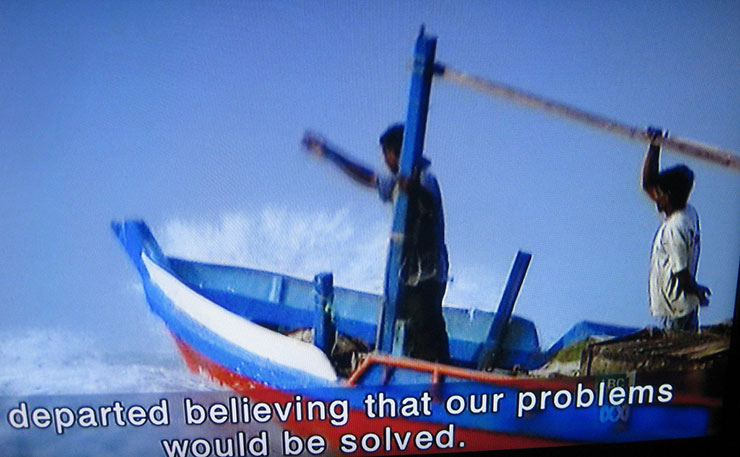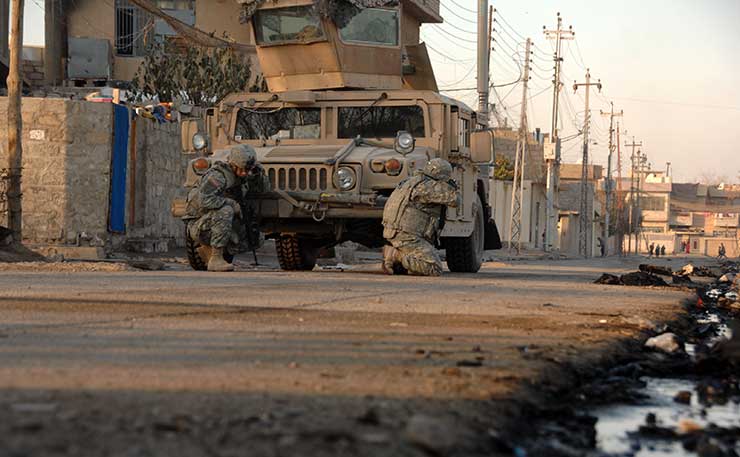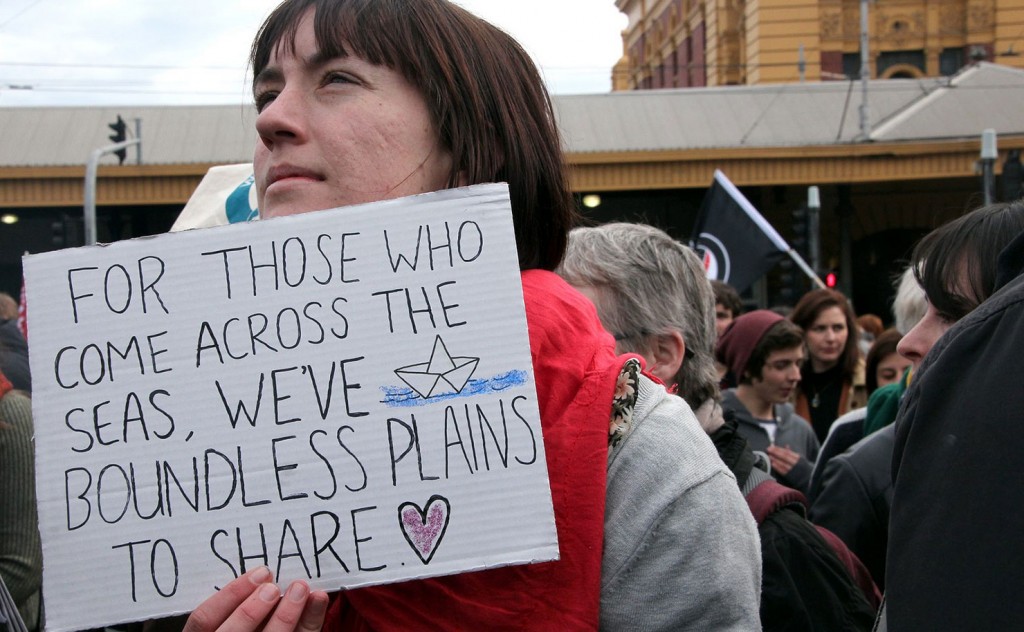One of the oldest philosophical quandaries has a great deal of resonance when it comes to Australia’s ‘refugee problem’, writes David Heslin.
Imagine the following scenario: you are sitting at the controls of a runaway tram (or trolley car). Up ahead, you can see a group of five people about to cross the tracks. You cannot avoid hitting them unless you divert at the oncoming fork in the track, where you will hit a solitary worker. What choice should you make?
The bane of every first-year philosophy student’s existence, the trolley problem is a classic philosophical dilemma. At its core, it’s an exercise in exploring how we think about ethics.
One’s answer to the question – of whether to switch tracks and kill the single worker, or to let the trolley car take its course and kill five – will tend to demonstrate what kind of moral reasoning one subscribes to, whether it be utilitarian or deontological.
For years now – and, particularly, since the outfit formerly known as Tony Abbott’s Liberal Party took office in 2013 – both major political parties have sought to convince us that, in the question of how to treat those who take to the seas in order to claim asylum here, Australia is in the midst of a trolley problem writ large.
Where the classic thought problem has five people standing in the path of an oncoming vehicle, our politicians invoke deaths caused by unseaworthy boats. Instead of the solitary individual on the other track, they offer up the people languishing in offshore prison camps.
The utilitarian response to the trolley problem is that it is better to sacrifice one life than kill five; likewise, the government argues that the cruelty of indefinite detention (so vividly elucidated by Guy Rundle) is an effective deterrent and far preferable to deaths at sea.

This argument seems to be working. The federal Labor Party, internally divided on this issue for the better part of two decades, has now fully embraced the government’s argument, advocating policies – such as boat turnbacks and the use of client states for detention – that contravene international law and were once considered verboten on both sides of politics. Otherwise progressive journalists, such as Jonathan Holmes and Bernard Keane, have also offered support for this system.
We shouldn’t, of course, be so naive as to presume that the political success of Australia’s refugee policy depends on a humanitarian argument. A large section of the Australian public has always been comfortable with refugees suffering discreetly so long as they don’t set foot in the country; for them, and the more xenophobic of our politicians, deaths at sea merely serve as a post-hoc justification.
But for Keane and Holmes, along with many other progressive-leaning Australians, that formulation is essential to their support. While they believe that the treatment of refugees on Manus Island and Nauru is needlessly cruel and secretive, they remain convinced that the process, and the argument that underlies it, are fundamentally correct: deaths at sea, after all, must be avoided, and neither writer can think of a significantly different alternative.
For a utilitarian like me, the trolley problem has only ever had one correct answer: the driver must switch tracks and kill the single worker. I have never found the deontological arguments to the contrary to be compelling: at its core, in my view, inaction is nothing more than another form of action, and provides no ethical get-out-of-jail card. But when applied to real world situations, trolley problem logic can become disastrous.
The biggest danger of transposing such utilitarian hypotheticals to real-world situations is that these thought exercises are, by their very nature, dualistic. In any first-year philosophy tutorial, you will inevitably get someone (likely facetiously) seek a way out of the problem – perhaps the victims can be warned, or the train can be derailed, or the driver can take better precautions.
They do this at least in part because that is the way we deal with problems in the real world. It is rare that a situation arises with only two possible outcomes (even if we’re talking in broad categories). But the ethical justification for acts with a grave human cost nearly always depends on binaries.
For otherwise compassionate people to accept a mass crime, they have to be assured that an even greater atrocity will otherwise occur – and the more alternative outcomes there are, the weaker that argument becomes.
To this day, many people will justify the bombings of Hiroshima and Nagasaki – which killed around 200,000 civilians and left a landscape and survivors to the long-term effects of radiation poisoning – on the grounds that, by ending the Second World War, they prevented a much greater loss of life.
Even if the atomic bombs were the primary cause of Japan’s surrender (and there’s plenty of reason to question that narrative), this argument relies on the frankly extraordinary premise that there was no other option – no act of diplomacy; no form of containment; no alternative military strategy; no warning shot – that could have possibly ended the war with far fewer deaths.
This belief is not much less extraordinary than the justification for that great pre-emptive strike of the early 21st Century: the invasion and destruction of Iraq as a functional state on the false grounds that Saddam Hussein had weapons of mass destruction.

In both cases, as with our country’s refugee policy, deliberate harm was presented as the more ethical alternative to a greater disaster – and more importantly, the only alternative.
What is being excluded in this binary approach to refugees? The first, most important issue is that it elides some crucial information. The government’s formulation of this problem weighs deaths at sea against a relatively small number of people locked up indefinitely for the sake of deterrence.
But it conveniently ignores the other harms caused by stopping the boats: for instance, those experienced by the refugees forced to remain in their existing conditions, the people who instead have to flee elsewhere by unsafe means and those who end up in under-resourced countries already struggling to cope with mass people movements.
We must not only be worried about deaths at sea, but also the deaths, injury, sickness and poverty that lead refugees to take flight in the first place.
A second problem is the claim that the only way to stop deaths at sea is by stopping the boat trade. Even if we are to only focus on that narrow and highly selective moral goal, the fact remains that there are many ways we can stop or at least significantly reduce the likelihood of drownings without the need to construct a barbed-wire-ringed advertisement out of human suffering.
The first, of course, is a global solution to the world’s various refugee crises that actually entails some form of domestic sacrifice. For one of the wealthiest countries in the world, Australia’s refugee intake has always been pitiful, and there is no justification for us not lifting our weight.
The second is a co-ordinated effort to assist in the effective rebuilding of the areas rendered uninhabitable by war or natural disaster – again, this requires a far more generous and well-directed foreign aid contribution than we currently offer.
The third is a regional treaty for monitoring waters around South-East Asia and the Indian Ocean, so that unseaworthy boats can be intercepted and passengers can be transported to safety.
The fourth is an efficient, humane onshore detention strategy that allows refugees into the community and gives non-refugees safe passage home.
In our current political milieu, such proposals are unlikely to be realised. But we must understand that, so long as the world is unable to cope with mass human displacement, people will continue to flee by any means necessary – and the fact that they believe such a dangerous boat trip is a worthwhile risk suggests that, in a great many cases, it very much is.
No such nuances exist in the government’s trolley problem. There are only two tracks: one of which leads to deaths at sea; one of which leads to nearly unlimited cruelty, so long as the first outcome is averted.
The philosopher Judith Jarvis Thomson offers a famous variant on the trolley exercise: in a hospital, five patients are on the verge of death due to various organ failures. In the waiting room next door, there is a healthy patient with all five organs in good working order. Is it justifiable, Thomson asks, to murder that man and distribute his organs, thus saving five lives?

(IMAGE: Takver, Flickr)
Most people are fine with switching tracks in the trolley car hypothetical, but much more hesitant to take the hard utilitarian approach in this scenario. Why?
The basic dilemma hasn’t been significantly altered; it is merely the problem and resolution that are different.
Perhaps, here, the utilitarian can justifiably demur; rationalising that the terror people would feel knowing that they might endure such a fate themselves would outweigh the benefits of saving a few lives.
But I suspect that what really drives our visceral reaction to this is the more vivid setting of the hospital waiting room and the violence of the murder by disembowelment – so far away from the rather more abstract universe of trolley cars. And even this, of course, still sits safely within the realm of the philosophy class hypothetical.
It has long been noted that our empathy drops away alarmingly the further people are from us geographically and culturally. The glibness with which many accept the bombing of Hiroshima today is in stark contrast with how they would feel if even two or three Australian civilians – let alone someone they knew – were obliterated in a random attack.
Rendered as invisible as possible by our government’s public relations strategy, the asylum seekers in our detention centres are barely any less distant.
In truth, trolley problems only ever happen to two kinds of people: stick figures in highly refined thought exercises, and foreigners who we treat as if they were stick figures. This dehumanisation is essential; it makes pulling the switch in the trolley car far less discomforting. Consequences that we would ordinarily find monstrous become possible.
This is not to say that the interests of the few must not sometimes be sacrificed for the interests of the many. Utilitarianism is founded upon such transactions, and, whether we realise it or not, most of us think of the world in broadly utilitarian terms. But when horrific abuses of human rights are justified by utilitarian binaries, we have sacrificed philosophy for fundamentalism.
Such is the history of humanity’s myriad atrocities; not just in Hiroshima and Baghdad, but in Islamic State-controlled Iraq and Syria, in Pol Pot’s Cambodia, in Inquisition-era Castille and Aragon, in the Australian missions of the 1930s, in the rubble of Gaza.
This is the legacy of utilitarian dualism, and historians will find no reason to omit 21st century Australia from that list.
We should listen to the jokers in the philosophy tutorial: it’s time to derail this trolley car.
Donate To New Matilda
New Matilda is a small, independent media outlet. We survive through reader contributions, and never losing a lawsuit. If you got something from this article, giving something back helps us to continue speaking truth to power. Every little bit counts.





